
Kimi Tsunagi Five M is the first studio album by Japanese rock band Asian Kung-Fu Generation and their second major-label release overall, released on November 19, 2003 on Kioon Music. The album's name is sometimes given as "Kunkei Five M," but the reading "Kimitsunagi" is given in katakana on the original compact disc. Peaking at number five on the Oricon charts, the LP retained two successful singles, "Mirai no Kakera" and "Kimi to Iu Hana, and has gone on to sell over 250,000 copies. The album is also featured in a live studio recording which is included as a bonus DVD from the limited edition of future compilation, Best Hit AKG.

Sol-fa is the second studio album by Japanese rock band, Asian Kung-Fu Generation, released on October 20, 2004.

Masafumi Gotoh is the lead vocalist, main songwriter and rhythm guitarist of the Japanese rock band Asian Kung-Fu Generation. Masafumi met fellow band members Kensuke Kita and Takahiro Yamada while attending a music club of Kanto Gakuin University. The three formed Asian Kung-Fu Generation in 1996, with drummer Kiyoshi Ijichi joining the band shortly after. As the main songwriter of the band, Gotō is accredited for engendering a majority of their lyrics, but has a strong tendency to share songwriting duties equally among his bandmates. His vocal style most often alternates between soft, melodic singing, and harder, harsher, yelling. Masafumi has a degree in economics and his favourite artists include Weezer, Number Girl, Oasis, Teenage Fanclub, and Beck. He produces records for other artists such as Chatmonchy, Dr. Downer and The Chef Cooks Me. He was also one of the founding members of the band Skeletons (スケルトンズ).

World World World is the fourth studio album by Japanese rock band Asian Kung-Fu Generation, released on March 5, 2008.

"Mirai no Kakera" is a song by Japanese rock band Asian Kung-Fu Generation. It was released as the first single of their major-label debut album, Kimi Tsunagi Five M, on August 6, 2003. The song's b-side, "Entrance," was later included on the band's 2006 compilation, Feedback File.

"Siren" is a song by Japanese rock band Asian Kung-Fu Generation. It was released as the lead single of their second full-length studio album, Sol-fa, on April 4, 2004. With the band's then-newly emerging popularity, the single managed to debut at number two on the Oricon charts. Although the song's B-side, "Siren#," shares a nearly identical title with the single, the two are somewhat different from each other. While both retain the same instrumental, the lyrics and melody of "Siren#" are different from that of "Siren." In a sense, "Siren#" can be considered a continuation or a remix of its A-side.
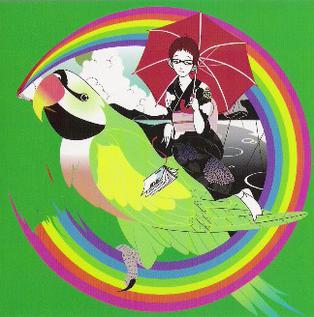
"Loop & Loop" is a song by the Japanese rock band Asian Kung-Fu Generation. It was the second single released from their second full-length studio album, Sol-fa, on May 19, 2004.

"After Dark" is a song by Japanese Indie rock band Asian Kung-Fu Generation. It was released as the second single of their fifth studio album, World World World, on November 7, 2007, nearly a whole year after the release of the album's lead single. The single debuted in the top ten on the Oricon charts and was selected to be used as the seventh opening theme of the anime series Bleach.
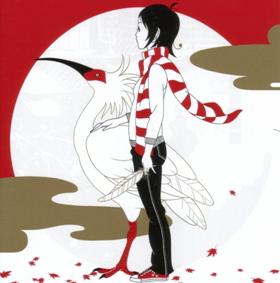
"Kimi no Machi Made" is a song by Japanese rock band Asian Kung-Fu Generation. It was released as the fourth and final single of their second full-length studio album, Sol-fa, on September 23, 2004.

"Blue Train" is a song by Japanese rock band Asian Kung-Fu Generation. It was released as the first single of their third studio album, Fanclub, on November 30, 2005. The song entered the top five on the Oricon charts and sold well over 100,000 copies by 2006, becoming the 94th single of the year.
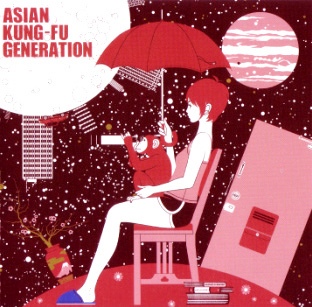
"World Apart" is a song by Japanese rock band Asian Kung-Fu Generation. It was released as the second single of their third studio album, Fanclub, on February 15, 2006. The song is unique for a number of reasons. Not only was it the first single AKG released following their ten-year anniversary, it also became their first number-one single, debuting at the top of the Oricon charts. The song's b-side, "Uso to Wonderland," was also the first recording in which Kensuke Kita held the position of lead singer.
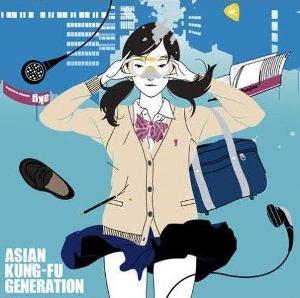
"Aru Machi no Gunjō" is a song by Japanese rock band Asian Kung-Fu Generation. It was released as the lead single of their fifth studio album, World World World, on November 29, 2006. The song was conceived on tour when the director of the then-upcoming anime film, Tekkonkinkreet, approached the band and requested a theme song for his film. AKFG proceeded to compose the track and released it as a single a month prior to the film's December 23 debut. The single peaked at number four on the Oricon charts and sold over 50,000 copies in 2006 alone, becoming the 199th single of the year. The song was ranked 5th on fans request for band's 10th anniversary live setlist on September 14, 2013.

"Korogaru Iwa, Kimi ni Asa ga Furu" is a song by Japanese rock band Asian Kung-Fu Generation. It was released as the third and last single of their fifth studio album, World World World, on February 6, 2008. The song was first introduced late 2007 during a live, onstage performance in Korea while the band was on its Project Beef tour. The song was ranked 8th on fans request for band's 10th anniversary live setlist on September 14, 2013.

"Solanin" (ソラニン) is a song by Japanese rock band, Asian Kung-Fu Generation. It was released as a single on March 31, 2010. The song was written for the film of the same name. The music was composed by band member Masafumi Gotoh, while the lyrics was written by Inio Asano, creator of the manga of the same name that the film is based on. Asian Kung-Fu Generation's recording was not used in the film. Instead, a cover, credited to Rotti, a fictional band from the film, with vocals by Aoi Miyazaki, who plays Meiko in the film, was used.
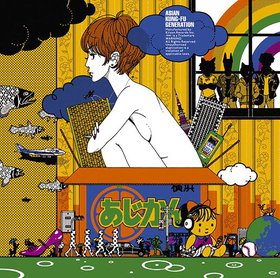
"Maigoinu to Ame no Beat" is the 15th single of Japanese rock band Asian Kung-Fu Generation from their album Magic Disk. The single was released on May 26, 2010. The first track is the main theme for the anime "Yojō-Han Shinwa Taikei", which features character design from Yusuke Nakamura, the same artist who illustrates their CD covers. Maigoinu to Ame no Beat is also their first song to feature brass instruments.

Magic Disk is the sixth studio album by the Japanese rock band Asian Kung-Fu Generation, released on June 23, 2010. It was announced in April 2010 after Gotoh posted an entry into his diary stating the title and that it would be released on June 23, 2010.

Best Hit AKG is a compilation album by the Japanese rock band Asian Kung-Fu Generation, released on January 18, 2012.
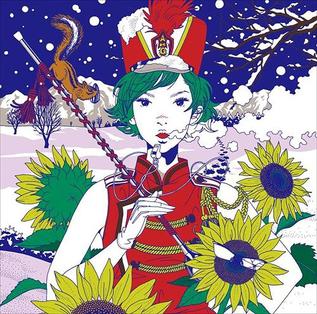
"Marching Band" is the 16th single of Japanese rock band Asian Kung-Fu Generation for their first best-of album Best Hit AKG. The single was released on November 30, 2011. The song "N2" is also featured on the album Landmark.

Landmark is the seventh studio album by the Japanese rock band Asian Kung-Fu Generation, released on September 12, 2012.

"Sore dewa, Mata Ashita" ) is a song by Japanese rock band Asian Kung-Fu Generation. It was released on July 25, 2012 and reached number 11 on the Oricon charts, make them failed to enter Top 10 since Kimi to Iu Hana. It was used as the theme song for Road to Ninja: Naruto the Movie and one of three song by Asian Kung-Fu Generation in the Naruto media, alongside Haruka Kanata and Blood Circulator. The song was ranked 9th on fans request for band's 10th anniversary live setlist on September 14, 2013.




















